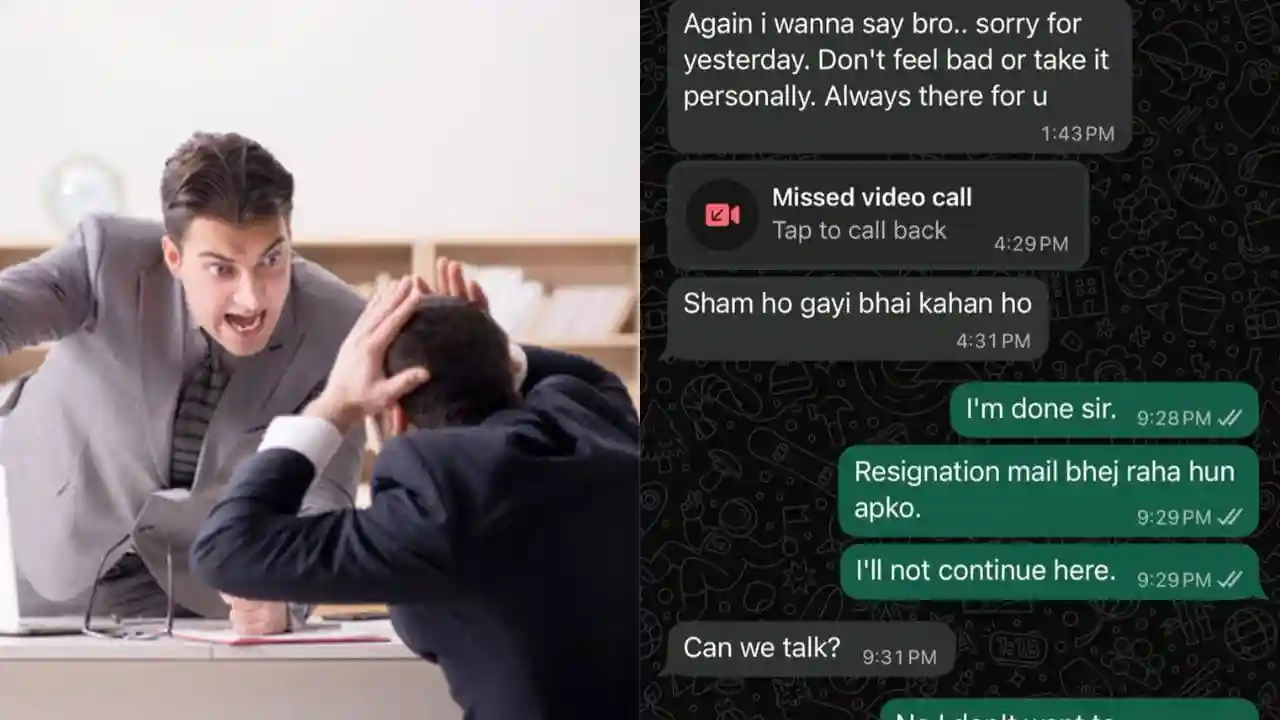In today’s fast-paced work culture, where deadlines are tight and pressure never seems to end, respect and a healthy environment matter more than ever. Recently, a young software engineer named Ashutosh Nautiyal from Dehradun became a talking point online after he quit his job due to feeling disrespected at work. What made this story viral was the WhatsApp chat between him and his manager — a chat that many working professionals instantly related to.
The story quickly spread across social media platforms like X (formerly Twitter), Instagram, and LinkedIn, gaining millions of views. It sparked conversations around self-respect, mental health, burnout, and toxic workplace culture. For many people, it was not just a story — it was a reflection of their everyday struggle.
The Viral WhatsApp Chat That Started It All
The incident took place on October 24, when Ashutosh posted a screenshot of his conversation with his manager on X. The chat began with the manager apologizing for something that happened the day before, saying:
“Bro, sorry for yesterday. Don’t take it personally. Always here for you.”
Hours later, when Ashutosh didn’t respond, the manager messaged again:
“Shaam ho gayi bhai, kahan ho?” (It’s evening, where are you?)
This time, Ashutosh replied — a message that shocked the manager and the internet:
“I’m done sir. I am sending my resignation mail. I will not continue here.”
The manager tried one last time to talk things out:
“Can we talk?”
But Ashutosh firmly refused:
“No, I don’t want to.”
With just a few lines, a common workplace issue was displayed — when apologies are too late, and the damage is already done.
Why He Quit: “Respect Matters More Than Salary”
Ashutosh later explained that he had been dealing with continuous disrespect, lack of recognition, and emotional stress. He said that even though the job paid him well, his mental peace and dignity were slowly slipping away. He decided that no job is worth losing self-respect.
His explanation struck a chord with thousands of professionals who shared similar stories in the comments section. Many said they too had stayed in toxic workplaces for too long because leaving felt risky. Some even said his bold decision gave them courage.
One user wrote:
“Mental peace is more important than any high-paying salary. Been there, did the same. Life gets better when you walk away.”
How The Internet Reacted
Once posted, the screenshot went viral overnight, receiving:
- Over 2.5 million views
- 11,000+ likes
- Hundreds of supportive comments
- Job offers from recruiters who appreciated his confidence
Some people admired his calm tone. Others said the conversation represented what many employees only wish they could say.
The hashtags #RespectAtWork, #QuitWithDignity, and #ToxicWorkCulture began trending, as people discussed their own experiences with bosses who don’t listen, recognize effort, or show empathy.
A Larger Trend: Why These Stories Keep Going Viral
In the last few years, India has seen a big shift in how young professionals view work. The old mindset of “adjust kar lo” (just tolerate it) is slowly fading. Gen Z and younger millennials believe:
- Work should not destroy mental peace
- Respect at work is non-negotiable
- Life exists outside office hours
- “Hustle culture” is not a personality
This aligns with global trends like:
- The Great Resignation
- Quiet quitting
- Anti-burnout movement
More people today are choosing to leave jobs instead of suffering silently.
Toxic Work Culture is a Real Problem
According to multiple workplace surveys in India:
- 70% of employees feel undervalued or unappreciated
- 55% say they experience stress or anxiety due to work
- 40% say they stayed longer than they should because of financial pressure or fear
Common workplace issues include:
| Issue | How It Affects Employees |
|---|---|
| Lack of respect | Low confidence and motivation |
| Long working hours | Burnout & health issues |
| Not being heard | Frustration and anger |
| Poor leadership | Frequent resignations |
| No work-life balance | Exhaustion and mental stress |
Ashutosh’s story didn’t go viral because it was shocking. It went viral because it felt familiar.
Why This Story Matters
This incident sends a powerful message:
✅ Respect is not a bonus — it’s a basic requirement
✅ Mental peace is more valuable than any paycheck
✅ It’s okay to walk away when a job affects your well-being
For employers, this is a wake-up call:
Simply saying “sorry” isn’t enough if the workplace culture is unhealthy. Employees today want transparency, empathy, and fair treatment.
For employees, this is a reminder:
You deserve to be treated with dignity — always.
Final Thoughts
Ashutosh’s story isn’t just about quitting a job. It is about knowing your worth. In a world that pushes people to work harder, faster, and without pause, it is important to stop and ask:
“Am I respected here?”
If the answer is no, then leaving is not weakness — it is self-respect.

